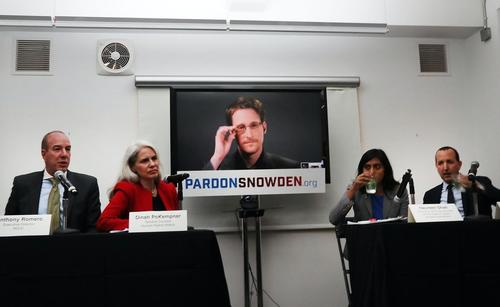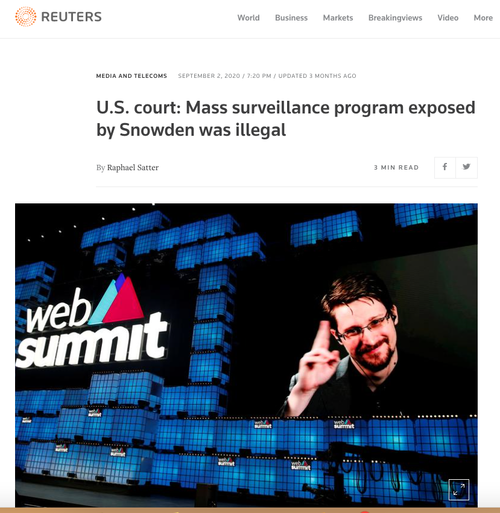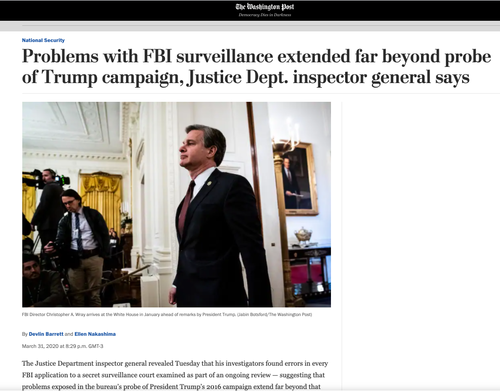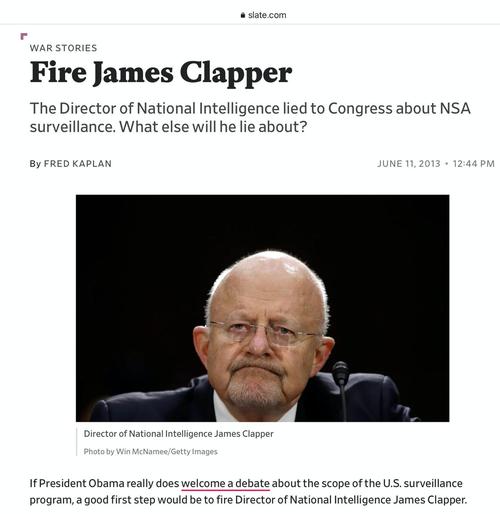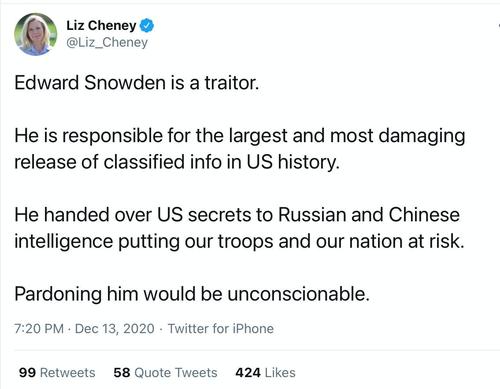The Case For Pardoning Edward Snowden By President Trump: Greenwald
Tyler Durden
Mon, 12/14/2020 – 20:40
Authored by Glenn Greenwald via greenwald.substack.com,
A U.S. appellate court in September unanimously ruled that the NSA’s program of mass domestic surveillance was illegal, as well as likely a violation of the Fourth Amendment’s guarantee against “unreasonable searches and seizures.” The court, and the broader public, knew about this illegal mass surveillance program created by the NSA only because Edward Snowden, while working inside that agency, discovered its existence and concluded in 2012 that the American public has the right know about what was being secretly done to them and their privacy by their own government.
Upon making the decision to blow the whistle on this security state illegality, Snowden delivered the documents relating to that program and other then-unknown systems of mass online surveillance not by dumping them indiscriminately on the internet or selling them or passing them to foreign governments, but by providing them to journalists (including myself) with The Guardian, The Washington Post and other news outlets. The documents Snowden provided were accompanied by requests to report them responsibly. He thus relinquished the power entirely to make decisions about which documents would and would not be published, leaving those decisions exclusively to news outlets.
That meant that Snowden himself never made a single document publicly available; every document that was reported was the result of decisions by newsrooms around the world that their publication would be in the public interest and would not endanger innocent people. That method of whistleblowing chosen by Snowden — patterned after the one Daniel Ellsberg used in 1971 to make the public aware of years of lying to the American public by the U.S. Government about the Vietnam War, when he gave the top-secret Pentagon Papers to The New York Times and asked them to report it in the public interest — enabled journalists to inform the American citizenry about illegal and unconstitutional spying by the U.S. Government in the most responsible manner possible.
Indeed, the very first program we reported — on June 6, 2013 — was the mass domestic spying program which the appellate court just ruled was illegal and likely a violation of the constitutional rights of all Americans. That first article we published revealed a top secret court order under which “the National Security Agency is currently collecting the telephone records of millions of US customers,” and required major telecommunications carriers “on an ‘ongoing, daily basis’ to give the NSA information on all telephone calls in its systems, both within the US and between the US and other countries.”
The months of reporting that followed, all singularly enabled by Snowden’s courageous whistleblowing, triggered so much vital public debate about privacy and mass surveillance, and fostered so many legal and technological privacy reforms around the world, that the reporting earned virtually every award journalism has to give, including the 2014 Pulitzer Prize for Public Service. For those who have not seen it, the 2014 documentary by Laura Poitras about the work Snowden did with journalists, Citizenfour, which received the 2015 Academy Award for Best Documentary, shows much of the Snowden story in real time and can be viewed on YouTube; the feature film “Snowden,” available on Netflix and other platforms, separately explores the trajectory which Snowden traversed from enlisted U.S. Army soldier, CIA contractor and NSA expert to one of this generation’s most consequential whistleblowers.
The recent appellate court ruling in U.S. v. Moalin, issued on September 2, emphasized the U.S. surveillance state’s sustained law-breaking. “The telephony metadata collection program exceeded the scope of Congress’s authorization” and “therefore violated that section of [the Foreign Intelligence Surveillance Act],” the court concluded, referring to the 1978 law requiring the government to first obtain warrants before spying on the communications of U.S. citizens. Though its ruling of illegality meant it was unnecessary to rule definitively on the program’s unconstitutionality, the court nonetheless noted that “the government may have violated the Fourth Amendment” with this spying program and warned of the dangers of “the collection of millions of [] people’s telephony metadata, and the ability to aggregate and analyze it.”
In ruling the NSA’s mass surveillance program illegal, the court noted the indispensable role Snowden played in enabling the protection of Americans’ rights. It was Snowden, explained the court, who “made public the existence of NSA data collection programs.” And, the court added, “Snowden’s disclosure of the metadata program prompted significant public debate over the appropriate scope of government surveillance” and ultimately led to reform: “Congress passed the USA FREEDOM Act, which effectively ended the NSA’s bulk telephony metadata collection program” and which “prohibited further bulk collection of phone records after November 28, 2015.” Moreover, observed the court, it was “news articles in the wake of the Snowden disclosures [which] revealed that the government had been using evidence derived from foreign intelligence surveillance in criminal prosecutions without notifying the defendants of the surveillance.”
This recent ruling is by no means the first time a court or other official body has declared illegal the spying programs which Snowden exposed. In 2015, CNN similarly reported that “a federal appeals court ruled on Thursday that the telephone metadata collection program, under which the National Security Agency gathers up millions of phone records on an ongoing daily basis, is illegal under the Patriot Act.” The New York Times reported in 2014 that “an independent federal privacy watchdog has concluded that the National Security Agency’s program to collect bulk phone call records has provided only ‘minimal’ benefits in counterterrorism efforts, is illegal and should be shut down.” In 2018, The Guardian reported about the British equivalent of the NSA: “GCHQ’s methods for bulk interception of online communications violated privacy and failed to provide sufficient surveillance safeguards, the European court of human rights has ruled.”
Abuses of power by these agencies continue in full force. More recently, the Justice Department’s Inspector General found in 2019 that the FBI deceived the FISA court with false statements to obtain a warrant to spy on former Trump 2016 campaign official Carter Page. A former FBI lawyer pled guilty to doctoring emails to obtain those spying warrants. A DOJ report found more material errors from the FBI in the spying process in 2019. Late last year, the FISA court itself “issued a strong and highly unusual public rebuke to the FBI” and, the prior year, “found that the FBI may have violated the rights of potentially millions of Americans — including its own agents and informants — by improperly searching through information obtained by the National Security Agency’s mass surveillance program.”
That is precisely the abuse Snowden acted to stop. And that is why the people and institutions across the political spectrum who have devoted themselves to protecting the right to privacy, safeguarding internet freedom and combating the abuses of the security state have advocated a pardon or clemency for Snowden: the ACLU, Sen. Rand Paul, The New York Times, Congressmen Matt Gaetz, Justin Amash, and Thomas Massie, Congresswoman Tulsi Gabbard, internet pioneer Timothy Berners-Lee, Daniel Ellsberg, Apple co-founder Steve Wozniak and Twitter CEO Jack Dorsey, press freedom groups, and international human rights and civil liberties groups. They have all argued that Snowden deserves clemency or a pardon.
Meanwhile, so many of the arguments against pardoning Snowden’s, and demanding his lifelong imprisonment or exile, have come from the very security state operatives whose crimes he exposed. That includes John Brennan and James Clapper, along with their hawkish and neocon allies such as Susan Rice and Liz Cheney. And to make their case, these Deep State operatives and warmongers rely upon one demonstrable lie after the next. Indeed, it was their blatant lies in the first place that prompted Snowden to knowingly risk his liberty by revealing the existence of these mass surveillance programs.
The first contact Snowden made with a journalist about the possibility of whistleblowing was a pseudonymous email he sent to me in December, 2012. But what solidified with finality his decision to blow the whistle was watching President Obama’s senior national security official, Director of National Intelligence James Clapper, commit a felony when he blatantly lied to the Senate on March 12, 2013, by falsely denying — when asked by Sen. Ron Wyden (D-OR) — that “the NSA collect[s] any type of data at all on millions or hundreds of millions of Americans.”
When Clapper told that lie, Snowden was holding the documents in his hand that proved that the NSA was doing exactly that which Clapper, in his public testimony, denied that it was doing. In other words, he knew for a fact that the senior national security official in the U.S. Government lied to the American people and the Senate about the mass spying they were conducting against Americans. A person in Snowden’s position acting with just and noble motives would be impelled to disclose, not conceal, the truth — and that’s exactly what Snowden did. The real criminals were security state officials like James Clapper for criminally lying to the Senate and his colleagues in the secret surveillance state who illegally spied on entire populations.
But James Clapper was never prosecuted for lying to the Senate. In fact, he did not even lose his job: he served as Director of National Intelligence for another three years, until the end of the Obama administration. And now this proven liar — like so many security state agents — works inside the corporate media, delivering the “news” for CNN. How can anyone justify wanting to see Edward Snowden rot in prison for life while the real powerful criminal whom he exposed, such as James Clapper, go free and thrive? Who besides as craven authoritarian would regard that as a just outcome?
Speaking of proven liars, those who oppose a pardon of Snowden do so by invariably lying about him and what he did. Why would they do that? It’s because the reality is that he acted honorably and for noble ends. So they have to manufacture falsehoods to justify their demands that a hero be punished.
Take, for instance, the completely fabricated accusations voiced Sunday night by Congresswoman Liz Cheney (R-WY), daughter of the former Vice President and key ally of pro-war House Democrats in blocking Trump’s plan to withdraw troops from Afghanistan and Germany. To justify her opposition to a Snowden pardon, she just lied outright:
That Snowden “handed over US secrets to Russian and Chinese intelligence” is every bit as much of a lie as those told by her dad in 2002 about Saddam’s nuclear weapons stockpiles and alliance with Al Qaeda. She just manufactured this accusation out of thin air. Nobody can ever prove a negative — therefore, nobody can proffer dispositive proof that Snowden (or, for that matter, Liz Cheney) did not turn over U.S. secrets to the governments in Beijing and Moscow — but the burden of proof is on those hurling accusations of this sort to produce evidence for it, and she has none. That’s because none exists.
But that does not stop Endless War advocates like Liz Cheney from saying it anyway — precisely because Liz Cheney is a pathological liar who will say anything to manipulate the public, just like her father taught her to do. The same is true of former CIA Director and proven pathological liar John Brennan. On Monday, he echoed the same false allegation as Liz Cheney did, in order to defend James Clapper and attack Senator Paul for advocating a pardon for Snowden:
Jim Clapper has had a lifetime of dedicated & selfless service to America.
Edward Snowden betrayed his country, providing exceptionally sensitive intelligence to China & Russia.
You consistently demonstrate utter ignorance of U.S. national security.
You disgrace the Senate. https://t.co/FO0FmmJZ8x
— John O. Brennan (@JohnBrennan) December 14, 2020
If there is any lesson we ought to have learned over the past two decades, it is that nobody should believe the claims of national security operatives without substantial evidence being presented. For anyone who wants to claim or believe that Snowden handed over secrets to Russia and/or China, you should demand evidence first. Where is it?
What makes this claim even more dishonest is that it exploits the fact that the U.S. Government forced Snowden, against his will, to stay in Russia. Snowden’s original plan, as has been amply documented, was to fly from Hong Kong after providing us with the archive and reviewing key documents, then transit through Moscow on his way to South America, where he intended to seek asylum in Ecuador or Bolivia.
But he was trapped in the Moscow International Airport because the U.S. State Department under John Kerry invalidated his passport while he was in transit, and then-Vice President Joe Biden threatened and coerced every other country considering offering him asylum or allowing him safe passage to South America (as he did with Cuba, which withdrew its offer of safe transit). A 2013 NPR headline tells part of that story: “Biden Asks Ecuador To Deny Snowden Asylum.” That was before he obtained asylum in Russia, something he was forced by Obama officials and Biden himself to do.
So U.S. officials first prevented Snowden from leaving Russia, and then, with such audacity and dishonesty, have for years exploited the fact that he’s in Russia to manipulate public opinion and smear him as a Kremlin agent. And, as is true for all such allegations that a U.S. citizen is working for Moscow, the accusation is tossed out routinely without any evidence, because there is none.
Then there’s the allegation that Snowden caused harm to national security or to innocent people, a claim that has been made against every whistleblower for decades who exposes corruption and criminality by the security state. Just as is true of the claim that Snowden sold or provided secrets to the governments of Russia and China, one should not even consider accepting the truth of this claim absent evidence to corroborate it.
Where is this evidence? Who was harmed by this NSA reporting? Not a single example or piece of evidence has ever been furnished in response to those questions, with the defenders of NSA opting to just repeat the accusation over and over in the hope that people will assume that it is true by virtue of is repetition.
But even if such harm could be established, the argument depends upon a complete distortion of the process used by Snowden to blow the whistle on Deep State criminality. Again, there is not one document from the NSA archive that was published because Snowden chose for it to be published. He used the opposite method for whistleblowing: recognizing that he should not have the power as a single individual to make choices about which documents should and should not be published, he instead gave the archive to journalists and asked that we make those decisions editorially, in as responsible a manner possible, guided by the standard journalistic public interest assessment.
That means that if there were documents that people believe should not have been disclosed, the choice to publish those documents rested with the top editors at leading media outlets — The Guardian, The Washington Post, The New York Times, NBC News and other outlets around the world — not with Snowden, who was never even consulted on these choices. Once Snowden realized the magnitude of criminality, deceit and corruption inside the security state, he concluded that the. most just course was to turn over to journalists a massive archive regarding these programs, so that it was not up to him to curate in advance which documents should be seen by the public, but instead leave it to experienced journalists to make those determinations.
Then there’s the claim — based on a substantial set of falsehoods — that Snowden somehow acted improperly by fleeing the U.S. to seek refuge in Russia rather than submitting himself to the U.S. justice system in order to “make his case”, a falsehood-drenched allegation voiced most memorably by Obama national security adviser Susan Rice to Charlie Rose in 2014:
The claim that Snowden should have or could have come back to the U.S. to convince a jury that what he did was justified is nothing short of a lie. Under the archaic statute which the Obama administration aggressively used to prosecute more whistleblowers than all previous administrations combined — the Espionage Act of 1917 — someone is automatically guilty if they provide classified information to a person who is unauthorized to receive it (including a journalist), and they are absolutely barred even from raising a “justification” defense in court.
In other words, as Susan Rice well knows, Snowden would not be able to return to the U.S. and try to convince a jury of his peers that what he did was justified because the law under which they chose to prosecute him does not allow a defendant even to raise that as a defense. Instead, this old statute ensures a rigged process where a guilty verdict is all but inevitable. That’s precisely why Obama officials and security state operatives use this 103-year-old law — originally designed by Woodrow Wilson to criminalize dissent from U.S. participation in World War I — against whistleblowers who expose their crimes not by acting with foreign governments but with journalists.
Then there’s the reality that — as Daniel Ellsberg argued in a Washington Post op-ed about Snowden’s leaving the U.S., headlined “NSA leaker Snowden made the right call” — those who are now accused of endangering national security have essentially no chance of obtaining a fair trial in the U.S. “The country I stayed in was a different America, a long time ago,” Ellsberg wrote, adding:
I hope Snowden’s revelations will spark a movement to rescue our democracy, but he could not be part of that movement had he stayed here. There is zero chance that he would be allowed out on bail if he returned now and close to no chance that, had he not left the country, he would have been granted bail. Instead, he would be in a prison cell like Chelsea Manning, incommunicado.
He would almost certainly be confined in total isolation, even longer than the more than eight months Manning suffered during her three years of imprisonment before her trial began recently. . . .
Snowden believes that he has done nothing wrong. I agree wholeheartedly. More than 40 years after my unauthorized disclosure of the Pentagon Papers, such leaks remain the lifeblood of a free press and our republic. One lesson of the Pentagon Papers and Snowden’s leaks is simple: secrecy corrupts, just as power corrupts….
But Snowden’s contribution to the noble cause of restoring the First, Fourth and Fifth amendments to the Constitution is in his documents. It depends in no way on his reputation or estimates of his character or motives — still less, on his presence in a courtroom arguing the current charges, or his living the rest of his life in prison. Nothing worthwhile would be served, in my opinion, by Snowden voluntarily surrendering to U.S. authorities given the current state of the law.
The idea that you must meekly submit to the world’s most aggressive Prison State, where the rules are made by the very high officials whose crimes you exposed, is authoritarian dreck.
Snowden well knew, when he decided to inform his fellow citizens of these systems of mass surveillance, that there was a very high probability that he would end up in a maximum security U.S prison for decades if not the rest of his life. That’s precisely what made Snowden’s actions so courageous: how many people would be willing to make that sacrifice? But that does not mean Snowden has some moral obligation to help an unjust state keep him in a cage for life out of vindictive vengeance because he exposed their crimes.
President Trump has, on two occasions, indicated that he was considering the possibility of pardoning Snowden. A pardon is not only just on its own terms but would also be an expression of exactly the reason the U.S. Constitution vests the unilateral pardon power in the U.S. President: to prevent the abuse of the justice system for vindictive ends or to shied abuses of official power by those who operate in the dark (my arguments for why the ongoing attempted extradition and prosecution of Julian Assange is also a massive abuse of power have been set forth in prior articles as well as in a show I produced on the topic).
If Trump follows through on a pardon of @Snowden, it’d be a huge victory against CIA/FBI/NSA abuses.
Everyone from @RandPaul, @MattGaetz & @TulsiGabbard to @ACLU, @BernieSanders & @NYTimes have advocated this.
The only ones angry would be Brennan, Clapper, Comey & Susan Rice. pic.twitter.com/wZR68xZdCB
— Glenn Greenwald (@ggreenwald) December 13, 2020
Even if you’re someone who believes that Snowden ought to be punished in some way — and I am not — he has been. Seven years in exile, separated from your friends, family and fellow citizens, in a country in which you never chose to live and to which you have no connections, is a serious deprivation. That is particularly true now that Snowden’s long-time partner, his American wife Lindsay Mills, announced that the couple is expecting their first child in January, a son who will automatically be a U.S. citizen and who should have the right to live with both of his parents in his country of citizenship.
For decades, it was a staple of left-wing politics that the CIA and the secret security state, long referred to by scholars as the Deep State, pose a grave threat to core democratic values and constitutional rights. Over the last five years, beginning with the 2016 election, the Trump movement and Trump himself has seen up close and personal how easily and casually those powers are abused, and how destructive are the results.
A pardon of Edward Snowden would be one of the greatest blows against Deep State abuse of secrecy and spying power in decades: probably the most significant act since President Eisenhower’s 1961 warnings in his Farewell Address about the growing anti-democratic dangers of the “military industrial complex” or, at the very least, the mid-1970s reforms of the intelligence community.
A pardon of Snowden by Trump would prompt bipartisan cheering across the U.S. and would engender support globally across the ideological spectrum. The only ones angered by it would be exactly those people — John Brennan, James Clapper, Jim Comey, Susan Rice — whose ongoing ability to abuse their spying power against the U.S. population depends upon their vindictive use of the justice system to destroy the lives of those who reveal their crimes.
Subscribe to Glenn Greenwald’s substack here.
![]()
Zero Hedge’s mission is to widen the scope of financial, economic and political information available to the professional investing public, to skeptically examine and, where necessary, attack the flaccid institution that financial journalism has become, to liberate oppressed knowledge, to provide analysis uninhibited by political constraint and to facilitate information’s unending quest for freedom. Visit https://www.zerohedge.com
